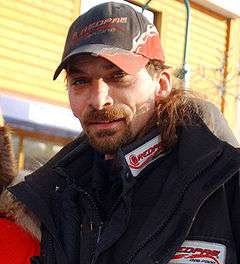Lance Mackey
Lance Mackey (born June 2, 1970[1]) is an American dog musher and dog sled racer from Fairbanks, Alaska, who is a four-time winner of the 1,000-mile Yukon Quest and four-time winner of the Iditarod Trail Sled Dog Race.
 Mackey at the 2009 Iditarod Race | |
| Personal information | |
|---|---|
| Nationality | United States |
| Born | June 2, 1970[1] |
| Residence | Fox, Alaska, USA |
| Website | Lance Mackey's Comeback Kennel |
| Sport | |
| Sport | Dogsled racing |
| Event(s) | Iditarod Trail Sled Dog Race |
Career
In 2007, Mackey became the first person to win both the Yukon Quest and Iditarod in the same year. This feat was considered almost impossible by many who?, and is considered one of the most impressive feats ever by a musher; he was nominated for a 2007 ESPY Award based on this double win. He also won the Veterinarians' Choice award after winning the 2007 Yukon Quest, stating, "This means more to me than winning this damn race".[2] 2008 was an even better year: Lance won the Tustumena 200, followed by his fourth consecutive Yukon Quest and his second Iditarod. In 2009, he chose not to run the 2009 Yukon Quest, but captured his third consecutive Iditarod.[3] In 2010, Mackey finished second in the Yukon Quest and won his 4th consecutive Iditarod, before sliding out of the top ten in the 2011 race. On May 7, 2020, the Idatrod announced that, due to a failed drug test, Lance Mackey’s 21st place finish at the 2020 Iditarod will be vacated. Mackey’s urine sample taken in White Mountain, a standard operating procedure for the first thirty mushers arriving at the checkpoint, tested positive for methamphetamine. [4]
Personal life
Lance's father, Dick Mackey, was one of the founders of the Iditarod Trail Sled Dog Race, and won the event by one second over Rick Swenson in 1978. Lance's half-brother Rick Mackey also won the Iditarod Trail Sled Dog Race in 1983. All three of them won the race on their sixth attempt wearing bib number 13.
Mackey was diagnosed with throat cancer in 2001 but continued sled dog racing entering the 2002 Iditarod race. After scratching from that race, he took a full year off from racing to recover from the disease. He is now considered cancer-free; however, Mackey suffered nerve damage in his left index finger as a result of the operation to remove the cancerous tumor. The nerve damage caused such unbearable pain in the finger that Mackey chose to have the finger surgically removed. The radiation from the treatments also destroyed his saliva glands, causing his teeth to disintegrate. He has had the infected teeth pulled, and is currently having his teeth rebuilt by dentists.
Awards and honors
Asteroid 43793 Mackey, discovered by Carolyn Shoemaker and David H. Levy at Palomar Observatory in 1990, was named in his honor.[5] Mackey was the subject of a 2015 independent feature-length documentary film called The Great Alone.
References
- http://www.adn.com/2010/02/26/1160278/like-father-like-son.html
- http://www.mackeyscomebackkennel.com/Races.htm
- Mackey Wins 3rd Iditarod SI, March 18, 2009
- Lance Mackey disqualified from 2020 Iditarod Idatarod, May 7, 2020
- "43793 Mackey (1990 VK7)". Minor Planet Center. Retrieved 5 February 2019.
External links
| Wikimedia Commons has media related to Lance Mackey. |
- Official website of Comeback Kennel